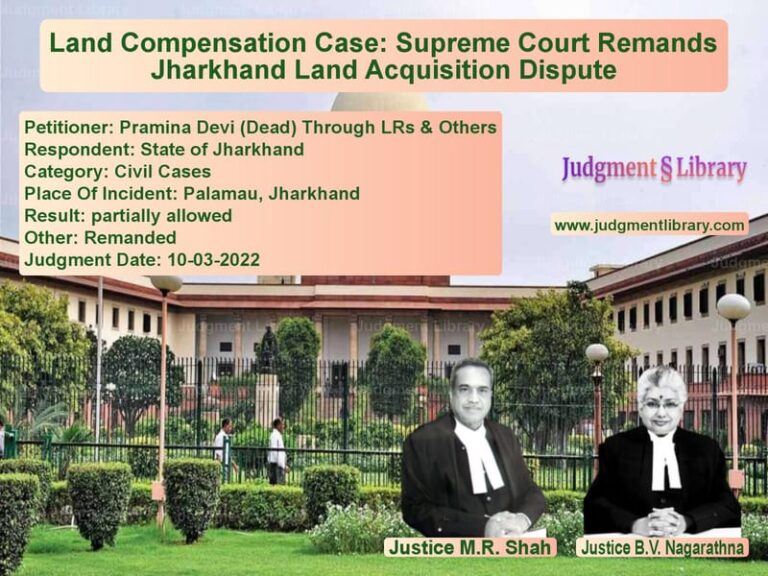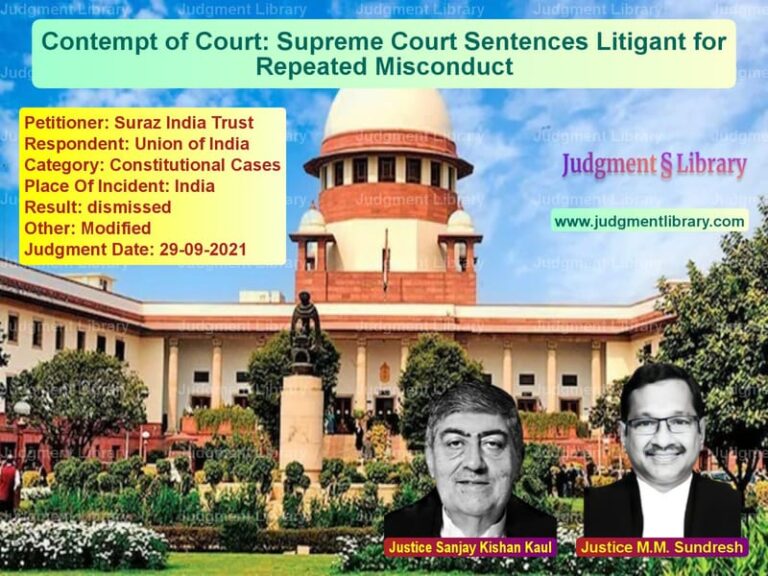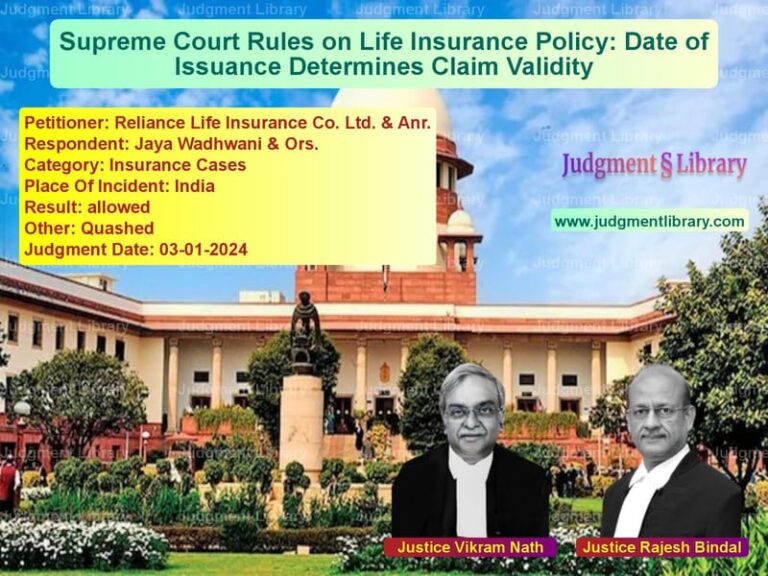Insurance Claim Denial and Exclusion Clause in Terrorism Cases: A Legal Review
This case concerns an appeal under Section 23 of the Consumer Protection Act, 1986, challenging the judgment of the National Consumer Disputes Redressal Commission (NCDRC). The appellant, Narsingh Ispat Ltd., contested the rejection of their claim by Oriental Insurance Company, after they suffered substantial damage due to a violent attack on their factory premises in Jharkhand. The core issue was whether the damage caused to the property fell within the Exclusion Clause of the insurance policy, which excluded coverage for damages caused by acts of terrorism.
Petitioner’s Arguments
The appellant, represented by counsel Shri Santosh Kumar, argued that the damage to their factory was caused by an unlawful attack involving armed anti-social elements who had entered their premises, looted the equipment, and caused significant destruction. According to the appellant, the attack was aimed at terrorizing the management and forcing them to pay a ransom, not a political or ideological motive. Despite the police registering an FIR and conducting an investigation, the appellant claimed that the insurance company unjustly relied on the Exclusion Clause, which cited terrorism as a reason for policy repudiation.
The appellant further emphasized that the First Information Report (FIR), investigation report, and closure report indicated that there was no conclusive evidence to support the claim that the attack was an act of terrorism as defined under the insurance policy. The appellant relied on the Court’s earlier ruling in the case of National Insurance Co. Ltd. v. Ishar Das Madan Lal, where it was held that exclusion clauses must be interpreted in favor of the insured in case of ambiguity. Thus, the appellant requested that the insurance claim be honored and the repudiation be reversed.
Respondent’s Arguments
The respondent, Oriental Insurance Company, represented by senior counsel Shri Santosh Paul, defended their stance by asserting that the act of destruction was an act of terrorism under the Exclusion Clause of the policy. They pointed out that the attack involved a large group of armed individuals who intended to create fear and disrupt the normal functioning of the appellant’s business. The respondent relied on the FIR and the fact that the police had invoked sections related to terrorism and unlawful assembly under the Criminal Law (Amendment) Act, 1908.
The respondent further argued that the Exclusion Clause was explicitly designed to cover damages caused by terrorism. They highlighted that the attack was conducted with the clear intent to terrorize and extort money, which, according to the respondent, falls within the definition of terrorism provided in the policy. The respondent also maintained that the burden of proof lay with the appellant to establish that the claim did not fall under the Exclusion Clause, which they argued the appellant failed to do.
Court’s Analysis and Conclusion
The Supreme Court analyzed the arguments put forth by both parties and reviewed the terms of the insurance policy, particularly the Exclusion Clause. The Court noted that the policy specifically excluded coverage for damages caused by terrorism and defined terrorism as acts intended to influence a government or create fear in the public. The Court examined the incident reports and found that while the attack involved criminal elements, there was no definitive proof that the attack was politically or ideologically motivated, as required by the definition of terrorism in the Exclusion Clause.
The Court observed that the repudiation of the claim by the insurance company was based on the assumption that the act was terrorism. However, the Court found that the burden of proving that the Exclusion Clause applied rested with the insurer. Since the evidence presented by the respondent did not conclusively prove that the incident met the definition of terrorism under the policy, the Court ruled in favor of the appellant. The Court noted that any ambiguity in the interpretation of the insurance contract should be resolved in favor of the insured, as per established legal principles.
Final Decision
The Supreme Court allowed the appeal and set aside the decision of the National Consumer Disputes Redressal Commission (NCDRC). The Court directed the respondent, Oriental Insurance Company, to honor the insurance claim and pay the amount of Rs. 89,00,000/- as assessed by the surveyor. Additionally, the Court ordered that the Commission should further evaluate the case for any additional compensation for the appellant. The Court emphasized that the terms of the insurance policy must be interpreted in favor of the insured in case of ambiguity and remitted the case to the NCDRC for further proceedings as necessary.
Petitioner Name: Narsingh Ispat Ltd..Respondent Name: Oriental Insurance Company Ltd..Judgment By: Justice Abhay S. Oka, Justice Ajay Rastogi.Place Of Incident: Jharkhand.Judgment Date: 02-05-2022.
Don’t miss out on the full details! Download the complete judgment in PDF format below and gain valuable insights instantly!
Download Judgment: narsingh-ispat-ltd.-vs-oriental-insurance-c-supreme-court-of-india-judgment-dated-02-05-2022.pdf
Directly Download Judgment: Directly download this Judgment
See all petitions in Insurance Settlements
See all petitions in Health Insurance Disputes
See all petitions in Commercial Insurance Disputes
See all petitions in Judgment by Abhay S. Oka
See all petitions in Judgment by Ajay Rastogi
See all petitions in allowed
See all petitions in supreme court of India judgments May 2022
See all petitions in 2022 judgments
See all posts in Insurance Cases Category
See all allowed petitions in Insurance Cases Category
See all Dismissed petitions in Insurance Cases Category
See all partially allowed petitions in Insurance Cases Category







